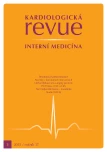The TECOS study – the effect of sitagliptin on cardiovascular events in patients with type 2 diabetes mellitus
Authors:
J. Špinar 1,2; L. Špinarová 3; J. Vítovec 3
Authors‘ workplace:
Interní kardiologická klinika LF MU a FN, Brno
1; Mezinárodní centrum klinického výzkumu, FN u sv. Anny v Brně
2; I. interní kardioangiologická klinika LF MU a FN u sv. Anny v Brně
3
Published in:
Kardiol Rev Int Med 2015, 17(3): 257-261
Category:
Cardiology Review
Overview
Background:
Sitagliptin, a dipeptidyl peptidase 4 inhibitor, is currently used in the treatment of patients with type 2 diabetes, however data are lacking on its long-term effect on cardiovascular events.
Methods:
In this randomised, double-blind study, we assigned 14,671 patients to add either sitagliptin or placebo to their existing therapy. Open-label use of antihyperglycaemic therapy was encouraged as required, aimed at reaching individually appropriate glycaemic targets in all patients. To determine whether sitagliptin was non-inferior to placebo, we used a relative risk of 1.3 as the marginal upper boundary. The primary cardiovascular outcome was a composite of cardiovascular death, nonfatal myocardial infarction, nonfatal stroke, and/or hospitalisation for unstable angina.
Results:
During an average follow-up of 3.0 years there was only a small decrease in glycated haemoglobin levels of 0.29 percentage points. Overall, the primary outcome occurred in 839 patients in the sitagliptin group (11.4%) and 851 patients in the placebo group (11.6%). Sitagliptin was non-inferior to placebo for the primary composite cardiovascular outcome (HR 0.98; p < 0.001). The rates of hospitalisation for heart failure did not differ between the two groups (p = 0.98). There were no significant between-group differences in the rates of acute pancreatitis (p = 0.07) or pancreatic cancer (p = 0.32).
Conclusions:
Among patients with type 2 diabetes and established cardiovascular disease, adding sitagliptin to the usual care did not appear to increase the risk of major adverse cardiovascular events, hospitalisation for heart failure, or other adverse events.
Keywords:
diabetes mellitus – sitagliptin – heart failure
Sources
1. Green JB, Betel MA, Armstrong PW et al. TECOS Study Group: Effect of Sitagliptin on cardiovascular outcomes in Type 2 Diabetes. N Engl J Med 2015; 373 : 232 – 242. doi: 10.1056/ NEJMoa1501352.
2. UK Prospective Diabetes Study (UKPDS) Group. Intensive blood ‑ glucose kontrol with sulphonylureas or insulin compared with conventional treatment and risk of complications in patients with type 2 diabetes (UKPDS 33). Lancet 1998; 352 : 837 – 853.
3. Holman RR, Paul SK, Bethel M et al. 10 - year follow up of intensive glucose control in type 2 diabetes. N Engl J Med 2008; 359 : 1577 – 1789. doi: 10.1056/ NEJMoa0806470.
4. American Diabetes Association. Standards of medical care in diabetes – 2015. Diabetes Care 2015; 38 (Suppl 4): S1 – S93.
5. Nissen SE, Wolski K. Effect of rosiglitazone on the risk of myocardial infarction and death from cardiovascular causes. N Engl J Med 2007; 356 : 2457 – 2471.
6. Holman RR, Sourij H, Califf RM. Cardiovascular outcome trials of glucoselowering drugs or strategies in type 2 diabetes. Lancet 2014; 383 : 2008 – 2017. doi: 10.1016/ S0140 ‑ 6736(14)60794 ‑ 7.
7. Department of Health and Human Services, Food and Drug Administration, Center for Drug Evaluation and Research. Guidance for industry: diabetes mellitus evaluating cardiovascular risk in new antidiabetic therapies to treat type 2 diabetes. December 2008. [online] Available from: http:/ / www.fda.gov/ downloads/ Drugs/ GuidanceCompliance RegulatoryInformation/ Guidances/ ucm071627.pdf.
8. European Medicine Agency, Committee for Medicinal Products for Human Use. Guideline on clinical investigation of medicinal products in the treatment of diabetes mellitus. January 2010. [online] Available from: http:/ / www.ema.europa.eu/ docs/ en_GB/ document_library/ Scientific_guideline/ 2010/ 02/ WC500073570.pdf.
9. Scirica BM, Bhatt DL, Braunwald E et al. Saxagliptin and cardiovascular outcomes in patients with type 2 diabetes mellitus. N Engl J Med 2013; 369 : 1317 – 1326. doi: 10.1056/ NEJMoa1307684.
10. White WB, Cannon CP, Heller SR et al. Alogliptin after acute coronary syndrome in patients with type 2 diabetes. N Engl J Med 2013; 369 : 1327 – 1335. doi: 10.1056/ NEJMoa1305889.
11. Udell JA, Cavender MA, Bhatt DL et al. Glucose‑lowering drugs or strategies and cardiovascular outcomes in patients with or at risk for type 2 diabetes: a meta‑analysis of randomised controlled trials. Lancet Diabetes Endocrinol 2015; 3 : 356 – 366. doi: 10.1016/ S2213 ‑ 8587(15)00044 ‑ 3.
12. Clifton P. Do dipeptidyl peptidase IV (DPP ‑ IV) inhibitors cause heart failure? Clin Ther 2014; 36 : 2072 – 2079. doi: 10.1016/ j.clinthera.2014.
13. Egan AG, Blind E, Dunder K et al: Pancreatic safety of incretin‑based drugs – FDA and EMA assessment. N Engl J Med 2014; 370 : 794 – 797. doi: 10.1056/ NEJMp1314078.
14. Zannad F, Cannon CP, Cushman WC et al. Heart failure and mortality outcomes in patients with type 2diabetes taking alogliptin versus placebo in EXAMINE: a multicentre, randomised, double‑blind trial. Lancet 2015; 385 : 2067 – 2076. doi: 10.1016/ S0140 ‑ 6736(14)62225 ‑ X.
15. Bethel MA, Green JB, Milton J et al. Regional, age and sex differences in baseline characteristics of patients enrolled in the Trial Evaluating Cardiovascular Outcomes with Sitagliptin (TECOS). Diabetes Obes Metab 2015; 17 : 395 – 402. doi: 10.1111/ dom.12441.
Labels
Paediatric cardiology Internal medicine Cardiac surgery CardiologyArticle was published in
Cardiology Review

2015 Issue 3
Most read in this issue
- Cardiac arrest and post‑cardiac arrest care
- Therapeutic approaches in exertional angina pectoris
- Leadless cardiac stimulation – future or fiction?
- A new device in intervention therapy of heart failure with preserved ejection fraction of left ventricle
